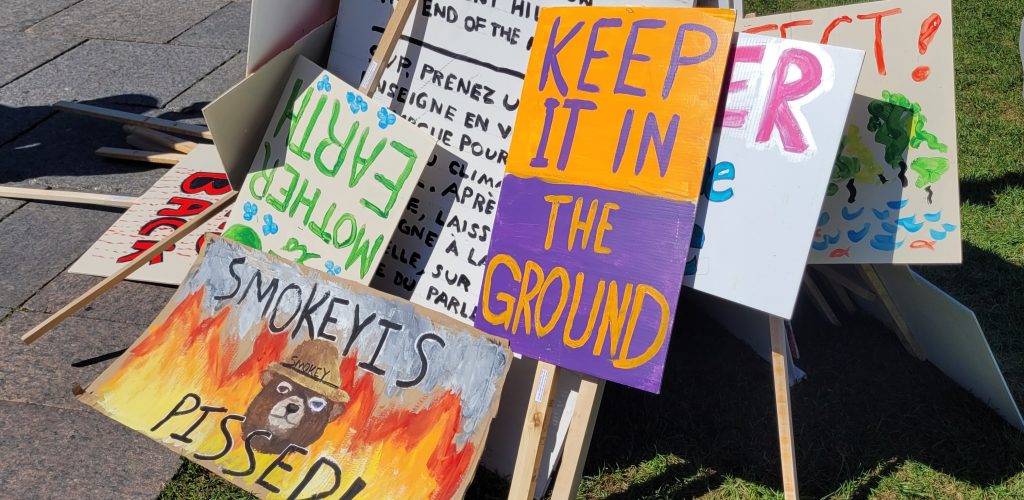Genevieve Gallant was a virtual delegate to COP28, the 28th Conference of the Parties to the United Nations Framework Convention on Climate Change, from Nov 30-Dec 12, 2023.
In political speak – COP28 was a complex event that showcased both the progress and the challenges inherent in global climate negotiations. The summit also underscored the need for greater ambition and a more robust response to the influence of big polluters.
What COP28 delivered:
- A political signal that the fossil fuel era needs to end and that the world will have to transition away from fossil energies.
- A clear indication of the time-frames: this needs to happen in this critical decade and must achieve net zero emissions globally by 2050.
A few highlights:
- It was a very big deal to have the decision text include specific wording about the transition away from fossil fuels. Fossil fuels – coal, oil and gas – are by far the largest contributor to global climate change.
- Explicitly naming the need for the phaseout of fossil fuels forces the world to recognize we are at the end of an era. COP28 gave us a clear indication of the timeframes: this needs to happen in this critical decade and must achieve net zero emissions globally by 2050. Is it enough? Let’s work on limiting the qualifiers and loopholes that allow for ongoing expansion of coal, oil and gas projects.
- Globally and in Canada fossil fuel production is up. Fossil fuel extraction and burning are also associated with many converging and localized social, economic, and environmental harms that are rarely accounted for in climate mitigation scenarios. This is what we mean when we need to focus on an integral ecology approach, where we consider the full range of consequences and address them in our response.
- Courage is contagious. During the summit 4 countries joined the Fossil Fuel Non-Proliferation Treaty, including Colombia! Globally and in Canada, between the provinces like Alberta and B.C., an equitable transition away from fossil fuel production must recognize differentiated responsibilities and capabilities.
- Up next is the hot button issue of finance, postponed to COP29 for the adoption of a new climate finance goal (NCQC). This new goal will replace developed countries’ current commitment of providing $100 billion annually in climate finance to developing nations, first agreed to in 2009. The new goal will need to take into account developing countries’ needs and priorities, estimated at $5.8 trillion – $5.9 trillion up until 2030.

THE DISCONNECT
No fossil fuel company or country has a real plan for phasing out fossil fuels. Almost all expect to continue extracting coal, oil and gas far into the future — far beyond what is needed to cut emissions in line with climate goals of keeping global warming to 1.5 or 2 degrees Celsius. Almost every country and company sees itself in a unique position, as the future last producer of fossil fuels, with unique reasons – ex: ‘we are the cleanest’, ‘we have the best carbon offset’, ‘we are not ‘them”. As a result, countries, including Canada, are rushing to gain the upper hand and share of the profits before the world turns toward renewables.
THERE IS ANOTHER WAY
Oil and gas is being extracted thanks to the social license, the informal contract between the public, private organizations, and the government that starts with public acceptance and is based on our trust in the legitimacy, credibility, effectiveness, and fairness of the project.
There’s a rush to produce oil and gas while we will still allow it. Will we allow it? As we move towards eliminating fossil fuels, faith-based organizations who can speak to these moral questions become central.
MULTILATERALISM FROM BELOW
Pope Francis calls us to reconfigure and recreate the old multilateralism, and to recognize that it is the civil society groups, like ORCIE, that help to compensate for the shortcomings of the international community and its lack of attention to fundamental human rights.
The demands that rise up from below throughout the world, where activists from very different countries help and support one another, can end up pressuring the sources of power. For this reason, I reiterate that “unless citizens control political power – national, regional and municipal – it will not be possible to control damage to the environment. Pope Francis in Laudate Deum
